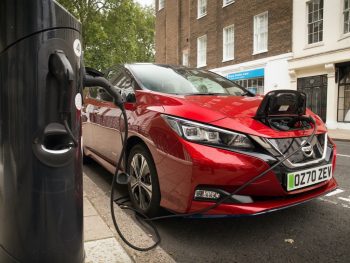UK’s multimillion pound investment in EV battery development and hydrogen vehicles
Projects to support electric vehicle battery development and hydrogen vehicles in the UK are to get off the ground with the help of multi-million pound government funding.

BEIS said the funding will support all stages of the automotive supply chain to make the switch to electric vehicles – from developing batteries, to exploring how to recycle them
Intended to help pave the way for the 2030 ICE ban, more than £30m (€35.1m) of government funding has been announced by the Department for Business, Energy and Industrial Strategy (BEIS).
The funding is being split into two segments. The first covers £9.4m (€11m) that will be split across 22 studies. Projects scoring funding include proposals to build a plant in Cornwall that will extract lithium for use in electric vehicle batteries, as well as a plant to build specialised magnets for electric vehicle motors in Cheshire.
Funding is also being given to work in Loughborough to assess a lightweight hydrogen storage tank for cars and vans, which it’s believed could help unlock the pathway to hydrogen propulsion.
A further £22.6m (€26.4m) has been committed by the government-backed Faraday Institution to continue its work to further improve the safety, reliability and sustainability of batteries. This includes investigating the root causes of cell failure in lithium-ion batteries and how this can lead to fires. The institution will also work to explore solid state batteries, which have the long-term potential to deliver improvements in safety and significantly increase EV range. The Faraday Institution will also look at recycling and reusing batteries to increase the sustainability of the future automotive supply chain, and will examine the use of batteries on the energy grid and for aerospace.
Minister for Investment Gerry Grimstone said: “We have set an ambitious target to phase out the sale of new petrol and diesel cars by 2030. To support that it is crucial we invest in research so we can power ahead with the shift to electric vehicles as we build back greener from the pandemic.
“The world-leading research announced today showcases the very best of British innovation and it will support all stages of the automotive supply chain to make the switch to electric vehicles – from developing batteries, to exploring how to recycle them.”
BEIS added that the investment in battery technology would not only help to improve performance and reduce costs of EVs, but could also support the creation of new jobs, new industries and the development of technologies to power the automotive and energy revolution in the UK.
But in particular, it will also support a shift in EV battery production to the UK, which is essential to avoid tariffs for UK-built electric vehicles and hybrids under Brexit and the new ‘rules of origin’ clause.
This clause sets out that, by 2026, at least 55% of the car’s value must be derived from the UK to ensure the model qualifies for tariff-free export to the EU; and vice versa.
Speaking earlier this year, automotive firm Horiba Mira had said that the UK-EU deal and the rules of origin will bring a surge in demand for development and testing of EV battery packs. Meanwhile Aston Martin boss and Nissan planning chief Dr Andy Palmer had issued a warning to the Government that the Brexit trade deal, alongside the 2030 ICE ban, presented a risk of “crippling tariffs” for the UK automotive industry unless the sector invested heavily in domestic battery production for electric vehicles.
Nissan has already said it’s planning to bring production of all batteries for its Sunderland-produced Leaf EV to the UK, helping to avoid EU tariffs.
Startup Britishvolt is also pushing ahead with plans for its ‘gigafactory’ in the North East. It’s bought rights to a site in Blyth, Northumberland, and submitted a planning application with Northumberland County Council, with a view to getting the site up and running by 2023 as the UK’s first gigafactory. And Coventry City Council and Coventry Airport have created a partnership to develop proposals for a gigafactory at Coventry Airport, which could be operational by 2025.
Speaking in the October 2020 confirmation of the 2030 ICE ban as part of the Government’s Ten-Point Plan for a ‘green industrial revolution, Prime Minister Boris Johnston said the Government was actively pursuing investment in a gigafactory and making up to £500m (£585m) funding available.
Earlier this month, Stephen Gifford, chief economist, Faraday Institution, spoke about the impact of the Brexit trade deal on EVs, batteries and the UK automotive industry – and on the need for UK-based gigafactories – at a briefing.
“The new rules of origin should provide the conditions for the UK automotive industry to succeed. But to do so, it is now more important than ever that gigafactories are built in the UK, and quickly, and with well-developed local supply chain.
“And the UK has a lot of catching up to do. China is the global leader in batteries and is subsidising EV manufacturing. The EU will also have a dozen gigafactories opened by 2025,” he said.
“But the support for battery manufacturing announced in the Prime Minister’s Ten-Point Plan and the wider Net Zero policies in the 2021 Budget will give the UK a fantastic boost in this increasingly competitive global race.”

